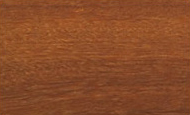Cumaru Decking Benefits & Specs
Below you will find detailed technical specs and information for cumaru decking. All of these facts point to one thing: cumaru makes an impressive decking material.
Here are the main reasons why Cumaru is so highly regarded among professional deck builders. With properties that mirror Ipe at much lower cost, you can build a deck that:
- Resists mold and termites without chemicals
- Beautifies your landscape and creates that instant outdoor escape
- Weathers the storms & UV rays from the sun without buckling under pressure
- Looks good years from now unlike pressure treated or peeling composites
- Can be enjoyed without having to be constantly repaired and/or maintained
Read on to see the technical info on Cumaru decking.

Botanical Name: Dipteryx Odorata
Other Names: Almendrillo, Brazilian Teak, Tonka, and Tonquin Bean
Origin: South America (Brazil)
Description:
Color ranges from a soothing golden tan to a warm reddish brown with some dark grain accents through out the wood.
Mechanical Properties:
This wood has a bending strength of 14,793 psi, and a Janka Hardness of 3540.
Working Properties:
Due to its superior strength, cumaru can be difficult to saw and bore with standard saws. Carbide tipped blades are recommended. Where severely interlocked grain is not present, the wood planes to a smooth surface. Glues poorly, but nails and screws well; pre-boring is necessary.
Durability:
Cumaru is very durable. The heartwood is resistant to both brown-rot and white rot fungi, with excellent weathering characteristics, and boasts a maintenance-free lifespan of 50+ years.
Seasoning:
Cumaru is rated as easy to air-season with a slight tendency to check and with moderate warping; drying was uniformly rapid.
Uses:
Outdoor Decking, flooring, cogs and shafts, heavy construction, barge and dock fenders, railroad crossties, pulp mill equipment, tool handles, bearings, turnery. A substitute for lignum vitae.
Comments:
The cumaru tree is cultivated in many areas for the tonka beans which are used as a vanilla flavoring. Various products of the cumaru tree are also used in tribal medicine.